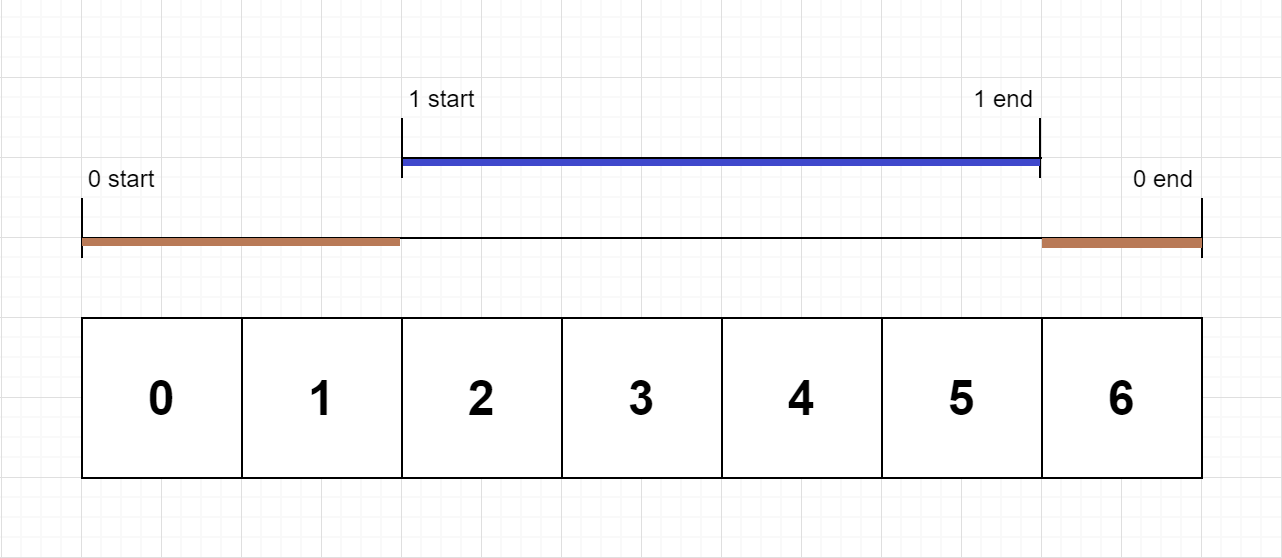0636. Exclusive Time of Functions¶
On a single-threaded CPU, we execute a program containing n functions. Each function has a unique ID between 0 and n-1.
Function calls are stored in a call stack: when a function call starts, its ID is pushed onto the stack, and when a function call ends, its ID is popped off the stack. The function whose ID is at the top of the stack is the current function being executed. Each time a function starts or ends, we write a log with the ID, whether it started or ended, and the timestamp.
You are given a list logs, where logs[i] represents the ith log message formatted as a string "{function_id}:{"start" | "end"}:{timestamp}". For example, "0:start:3" means a function call with function ID 0 started at the beginning of timestamp 3, and "1:end:2" means a function call with function ID 1 ended at the end of timestamp 2. Note that a function can be called multiple times, possibly recursively.
A function's exclusive time is the sum of execution times for all function calls in the program. For example, if a function is called twice, one call executing for 2time units and another call executing for 1 time unit, the exclusive time is 2 + 1 = 3.
Return the exclusive time of each function in an array, where the value at the ith index represents the exclusive time for the function with ID i.
Example 1:

Input: n = 2, logs = ["0:start:0","1:start:2","1:end:5","0:end:6"]
Output: [3,4]
Explanation:
Function 0 starts at the beginning of time 0, then it executes 2 for units of time and reaches the end of time 1.
Function 1 starts at the beginning of time 2, executes for 4 units of time, and ends at the end of time 5.
Function 0 resumes execution at the beginning of time 6 and executes for 1 unit of time.
So function 0 spends 2 + 1 = 3 units of total time executing, and function 1 spends 4 units of total time executing.
Example 2:
Input: n = 1, logs = ["0:start:0","0:start:2","0:end:5","0:start:6","0:end:6","0:end:7"]
Output: [8]
Explanation:
Function 0 starts at the beginning of time 0, executes for 2 units of time, and recursively calls itself.
Function 0 (recursive call) starts at the beginning of time 2 and executes for 4 units of time.
Function 0 (initial call) resumes execution then immediately calls itself again.
Function 0 (2nd recursive call) starts at the beginning of time 6 and executes for 1 unit of time.
Function 0 (initial call) resumes execution at the beginning of time 7 and executes for 1 unit of time.
So function 0 spends 2 + 4 + 1 + 1 = 8 units of total time executing.
Example 3:
Input: n = 2, logs = ["0:start:0","0:start:2","0:end:5","1:start:6","1:end:6","0:end:7"]
Output: [7,1]
Explanation:
Function 0 starts at the beginning of time 0, executes for 2 units of time, and recursively calls itself.
Function 0 (recursive call) starts at the beginning of time 2 and executes for 4 units of time.
Function 0 (initial call) resumes execution then immediately calls function 1.
Function 1 starts at the beginning of time 6, executes 1 units of time, and ends at the end of time 6.
Function 0 resumes execution at the beginning of time 6 and executes for 2 units of time.
So function 0 spends 2 + 4 + 1 = 7 units of total time executing, and function 1 spends 1 unit of total time executing.
Example 4:
Input: n = 2, logs = ["0:start:0","0:start:2","0:end:5","1:start:7","1:end:7","0:end:8"]
Output: [8,1]
Example 5:
Input: n = 1, logs = ["0:start:0","0:end:0"]
Output: [1]
Constraints:
1 <= n <= 1001 <= logs.length <= 5000 <= function_id < n0 <= timestamp <= 109- No two start events will happen at the same timestamp.
- No two end events will happen at the same timestamp.
- Each function has an
"end"log for each"start"log.
Analysis¶
By observation, we can find that two ids cannot interlace with each other (this is invalid: ["0:start:0","1:start:2","03","1
5"]), so we can maintain a stack that records the start time's id, so when finish we pop the top one (which is guarantee to be the last started id).
- if new one is another "start" timestamp, we push to the stack and update the top id's execuation time.
- if new one is another "end" timestamp, we pop the top one and update the resulting time.
Time: O(n) since each element is going to run into the stack once Space: O(n)
Code¶
class Solution {
public:
vector<string> inline parse(string& str) {
string id, status, timestamp;
for (int i = 0, j = 0; i < str.length(); ++i) {
if (str[i] == ':' && !j) {
id = str.substr(0, i);
j = i + 1;
} else if (str[i] == ':' && j) {
status = str.substr(j, i - j);
j = i + 1;
} else if (i == str.length() - 1) {
timestamp = str.substr(j);
}
}
return {id, status, timestamp};
}
vector<int> exclusiveTime(int n, vector<string>& logs) {
vector<int> time(n);
auto first = parse(logs[0]);
stack<int> st{{ stoi(first[0]) }};
for (int i = 1, prev = stoi(first[2]); i < logs.size(); ++i) {
auto raw = parse(logs[i]);
if (raw[1] == "start") {
if (!st.empty())
time[st.top()] += stoi(raw[2]) - prev;
st.push(stoi(raw[0]));
prev = stoi(raw[2]);
} else {
time[st.top()] += stoi(raw[2]) - prev + 1;
st.pop();
prev = stoi(raw[2]) + 1;
}
}
return time;
}
};